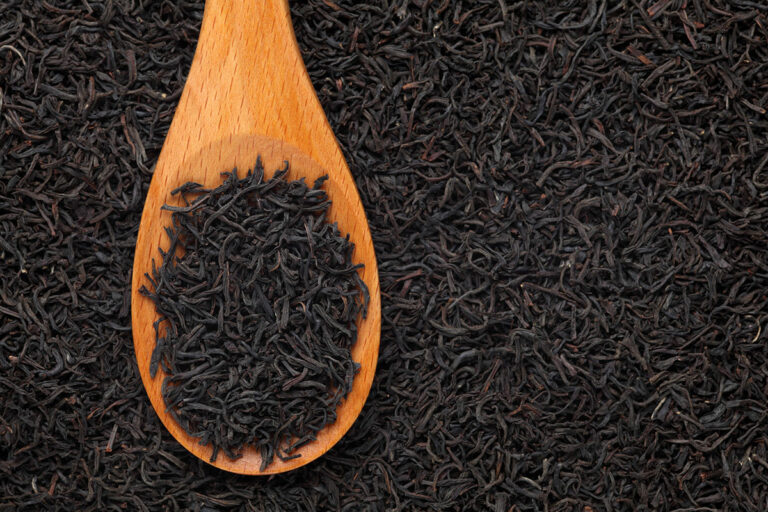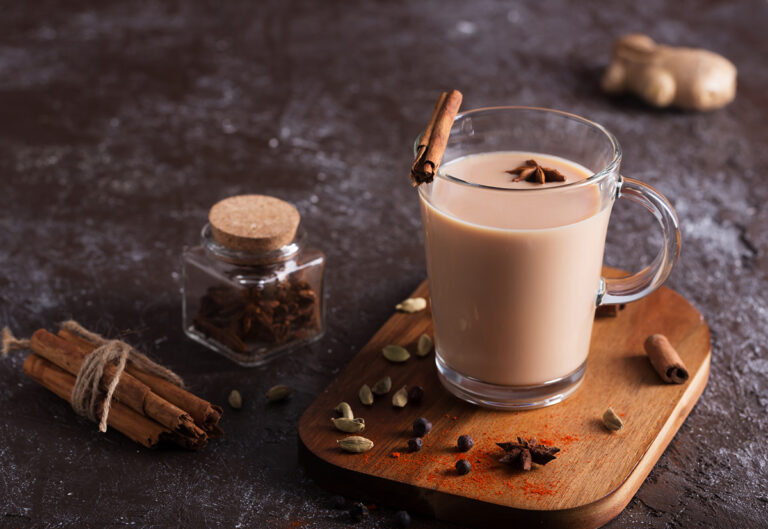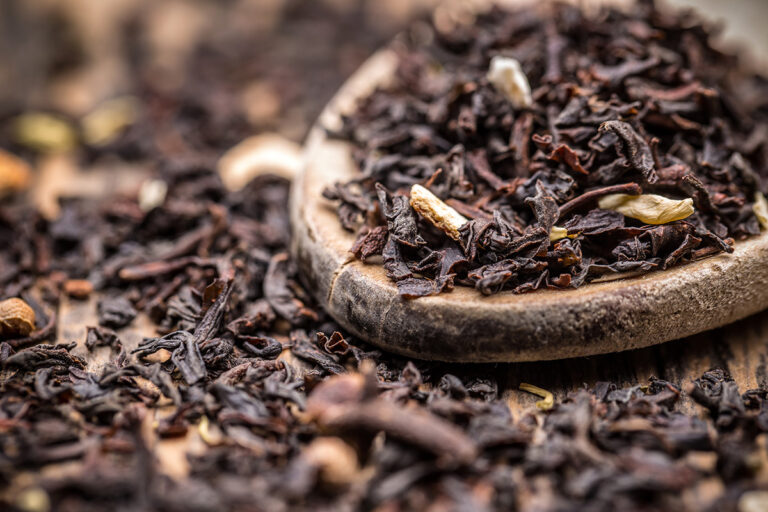Assam Tea Benefits and Side Effects
Assam tea, originating from the lush tea gardens of the Assam region in India, is known for its bold, robust, and malty flavor, making it a popular choice among tea enthusiasts worldwide.
In this post, we will delve into the intricacies of Assam tea, discussing its unique characteristics, how to prepare it, its health benefits and potential side effects, and answering some frequently asked questions.

What Is Assam Tea?
Assam tea is a type of black tea that is grown and produced in the Assam region of India. This region is located in the northeastern part of the country, near the Brahmaputra River. The tea is known for its strong, bold, and malty flavor profile due to the region’s unique climatic conditions and soil.
Assam tea is made from the leaves of the Camellia sinensis var. assamica plant, a sub-species of the tea plant native to the region. The plants thrive in the Assam Valley’s hot, humid, and rainy environment, which contributes to the tea’s distinct taste.
Assam tea is popular both as a standalone tea and as a base for blending other tea varieties, such as English Breakfast and masala chai. It is rich in antioxidants and can be enjoyed with or without milk and sugar, depending on personal preferences.
Two Types of Assam Tea
Assam tea can be broadly categorized into two types based on the production process: Orthodox and CTC. Both types are made from the same Camellia sinensis var. assamica plant, but their manufacturing methods and resulting characteristics differ.
Orthodox Assam Tea
Orthodox Assam tea is produced using traditional methods, which involve hand-plucking the tea leaves and processing them through several stages, including withering, rolling, oxidizing (fermentation), and drying. The whole leaves are often rolled, resulting in a range of tea leaf sizes and shapes, from whole leaves to smaller broken leaves.
Orthodox Assam tea is known for its nuanced flavors, often described as having a malty, bold, and brisk taste with a touch of astringency. The tea’s liquor is typically dark amber to reddish-brown in color.
Orthodox Assam tea is generally considered to be of higher quality, and it is more sought after by connoisseurs and tea enthusiasts who appreciate the subtleties in flavor and aroma that this method of production offers.
CTC Assam Tea
CTC (Crush, Tear, Curl) is a mechanized process that was developed in the 1930s and has become widely popular due to its efficiency and ability to produce a strong, robust tea. In the CTC process, tea leaves are passed through cylindrical rollers with sharp teeth that crush, tear, and curl the leaves into small, uniform granules or pellets.
CTC Assam tea is characterized by its bold, full-bodied flavor, and deep reddish-brown liquor. The tea has a brisk, astringent quality, and it is often used as a base for various tea blends, such as English Breakfast and masala chai. Due to its strong flavor, CTC Assam tea is particularly well-suited for consumption with milk and sugar, as the tea’s robustness can hold up well against the added flavors.
What Does Assam Tea Taste Like?
Assam tea is known for its distinctive flavor profile that sets it apart from other black teas. The taste of Assam tea can be described as bold, rich, and malty, with a brisk and robust character. It often exhibits a natural sweetness and a slight astringency, which gives the tea a pleasant, mildly bitter finish.
The color of the brewed tea ranges from a dark amber to a reddish-brown hue, which can also influence the perception of its taste. The bold flavor of Assam tea makes it ideal for pairing with milk and sugar, as the tea can hold its own against these added flavors without being overpowered. However, it can also be enjoyed on its own, allowing the drinker to appreciate the tea’s unique characteristics.
How to Prepare Assam Tea
Preparing a delicious cup of Assam tea is simple and can be done using either loose-leaf tea or tea bags. Here’s a step-by-step guide on how to prepare Assam tea:
- Boil water: Start by boiling fresh, cold water. The ideal temperature for brewing Assam tea is between 200°F to 212°F (93°C to 100°C). If you don’t have a temperature-controlled kettle, bring the water to a rolling boil and then let it cool for about 30 seconds to reach the desired temperature.
- Measure the tea: For loose-leaf Assam tea, use approximately 1 teaspoon of tea leaves for every 8 ounces (240 ml) of water. One tea bag per cup is usually sufficient if you’re using tea bags.
- Pre-warm the teapot or cup: To maintain the water temperature during steeping, pre-warm your teapot or cup by rinsing it with hot water. This step is optional but recommended for an optimal tea experience.
- Add tea leaves: Place the tea leaves or tea bag into the teapot or cup. You can also use a tea infuser or a teapot with a built-in strainer if you use loose-leaf tea.
- Pour the hot water: Slowly pour the hot water over the tea leaves or tea bag, making sure all the leaves are submerged, or the tea bag is fully saturated.
- Steep the tea: Allow the tea to steep for 3 to 5 minutes. The steeping time can be adjusted based on your personal taste preferences. A shorter steeping time will yield a milder flavor, while a longer steeping time will produce a stronger, more robust taste.
- Strain or remove the tea bag: If using loose-leaf tea, strain the tea leaves using a tea strainer or by pouring the tea through the teapot’s built-in strainer. If using a tea bag, simply remove the tea bag and gently squeeze it to extract any remaining tea.
- Serve: You can enjoy Assam tea plain or with added milk, sugar, honey, or lemon, depending on your preference. If you are adding milk, pour the tea into the cup first, then add the milk to better control the color and taste. Adjust the additives to your desired taste, and enjoy your Assam tea.
Remember that the preparation method can be adjusted based on your personal taste preferences, and you can experiment with steeping times, water temperatures, and additives to find the perfect cup of Assam tea for you.
How Much Caffeine Is in Assam Tea?
Assam tea, like most black teas, contains a moderate to high amount of caffeine. The exact caffeine content can vary depending on factors such as the tea variety, processing method, and preparation technique. On average, an 8-ounce (240 ml) cup of Assam tea contains between 40 to 80 milligrams of caffeine.
Assam Tea Health Benefits
Assam tea, like other types of tea derived from the Camellia sinensis plant, offers several health benefits due to its rich content of antioxidants, vitamins, and minerals. Some of the potential health benefits of Assam tea include:
- Rich in antioxidants: Assam tea contains a variety of antioxidants, including polyphenols and catechins, which help protect the body from damage caused by free radicals. These antioxidants may contribute to reducing the risk of chronic diseases such as heart disease, certain types of cancer, and neurodegenerative disorders (1, 2).
- Heart health: Regular consumption of black tea, including Assam tea, has been associated with improved heart health (3, 4, 5). It may help lower bad cholesterol (LDL) levels, reduce blood pressure, and improve blood vessel function, which can contribute to a reduced risk of cardiovascular diseases.
- Enhanced mental alertness: The caffeine content in Assam tea can help improve mental alertness, focus, and cognitive function. Moderate caffeine intake has also been linked to a reduced risk of developing neurodegenerative diseases like Alzheimer’s and Parkinson’s.
- Weight management: Some studies suggest that the polyphenols and catechins found in black tea may aid in weight management by increasing metabolism, promoting fat oxidation, and improving insulin sensitivity.
- Improved digestive health: Assam tea contains tannins, which have been known to positively affect digestion by reducing inflammation in the gastrointestinal tract and promoting the growth of good bacteria in the gut (6).
- Immune system support: The antioxidants and antimicrobial properties of Assam tea may help strengthen the immune system and protect the body against infections and illnesses.
- Oral health: Black tea, including Assam tea, contains compounds like catechins and fluoride that may contribute to improved oral health by inhibiting the growth of bacteria, reducing plaque formation, and preventing tooth decay.
It’s important to note that while Assam tea offers health benefits, excessive tea consumption, especially with added sugar or milk, can negate some of these benefits. Additionally, the caffeine content in Assam tea may not be suitable for everyone, particularly those who are sensitive to caffeine or have certain health conditions. As with any beverage, moderation and balance are key to enjoying the health benefits of Assam tea.
Assam Tea Side Effects
While Assam tea offers several health benefits, it may also have some potential side effects, mainly due to its caffeine content and the presence of certain compounds. Here are some possible side effects of Assam tea:
- Caffeine-related side effects: The caffeine in Assam tea may cause side effects such as restlessness, insomnia, increased heart rate, jitteriness, and anxiety, especially in individuals sensitive to caffeine or those who consume excessive amounts of tea.
- Sleep disruption: Drinking Assam tea or other caffeinated beverages close to bedtime may interfere with sleep, leading to difficulty falling asleep, disrupted sleep patterns, or reduced sleep quality.
- Gastrointestinal issues: Some individuals may experience gastrointestinal discomfort, such as acid reflux, heartburn, or stomach upset, after consuming Assam tea. The tannins in the tea can also cause constipation or, in some cases, diarrhea. If you experience gastrointestinal issues after drinking Assam tea, consider reducing your consumption or opting for a different type of tea.
- Iron absorption: The tannins in Assam tea can interfere with the absorption of non-heme iron, which is the type of iron found in plant-based foods (7). This can be particularly problematic for individuals with iron deficiency or those who follow a vegetarian or vegan diet. To minimize this effect, avoid consuming tea with meals, and consider consuming iron-rich foods or taking iron supplements at different times of the day.
- Pregnancy and breastfeeding concerns: Pregnant and breastfeeding women should monitor their caffeine intake, as excessive caffeine consumption may pose risks to the developing fetus or nursing infant (8).
- Drug interactions: Assam tea, particularly due to its caffeine content, can interact with certain medications, such as stimulants, blood thinners, and some antibiotics. If you are taking any medications, consult your healthcare provider to ensure that it is safe to consume Assam tea.
While these side effects are possible, they are generally associated with excessive tea consumption or individual sensitivities. For most people, moderate consumption of Assam tea is safe and unlikely to cause significant side effects.
Final Thoughts
Assam tea is a flavorful and versatile black tea that can be enjoyed on its own or used as a base for various tea blends. Its bold taste, rich aroma, and numerous health benefits make it a beloved choice for many tea drinkers.
FAQ
Is Assam the Strongest Tea?
Yes, Assam is generally considered the strongest black tea. It is known for its bold, robust, and malty flavor, and has a relatively high caffeine content compared to other black teas, which contributes to its strong, invigorating nature. The specific strength of the tea can vary depending on factors like the tea variety, processing method, and brewing technique.
When Should I Drink Assam Tea?
Assam tea can be enjoyed at any time of the day. However, due to its caffeine content, it is often preferred as a morning or early afternoon tea to provide an energy boost and mental alertness.
If you are sensitive to caffeine or have trouble sleeping, avoiding Assam tea in the evening or close to bedtime is best.
Should I Add Milk to Assam Tea?
Adding milk to Assam tea is a matter of personal preference. The bold flavor of Assam tea can hold up well against the addition of milk and sugar, which is why it is commonly used as a base for tea blends like English Breakfast and masala chai. Experiment with milk, sugar, honey, or lemon to find your ideal taste.
Is Assam Tea the Same as English Breakfast?
Assam tea is not the same as English Breakfast but is often used as a key component in English Breakfast blends. English Breakfast is a blend of several black teas, typically including Assam, Ceylon, and Kenyan teas. The combination of these teas creates a robust, full-bodied flavor that is well-suited for consumption with milk and sugar.
What Is the Difference Between Assam and Ceylon Tea?
Assam tea and Ceylon tea are both types of black tea, but they originate from different regions and have distinct flavor profiles. Assam tea is grown in the Assam region of India and has a bold, malty, and brisk flavor. Ceylon tea is produced in Sri Lanka and is known for its bright, citrusy, and sometimes floral notes. Both teas can be enjoyed on their own or used as a base for various tea blends.
Is Assam Tea Like Earl Grey?
Assam tea and Earl Grey are different types of tea, but they can share some similarities. Assam tea is a pure black tea with a bold, malty flavor, while Earl Grey is a flavored black tea, typically made by blending black tea leaves (often including Assam) with oil of bergamot, a citrus fruit. The bergamot oil gives Earl Grey its distinct aroma and taste, which can be described as a combination of citrus, floral, and slightly sweet notes.



